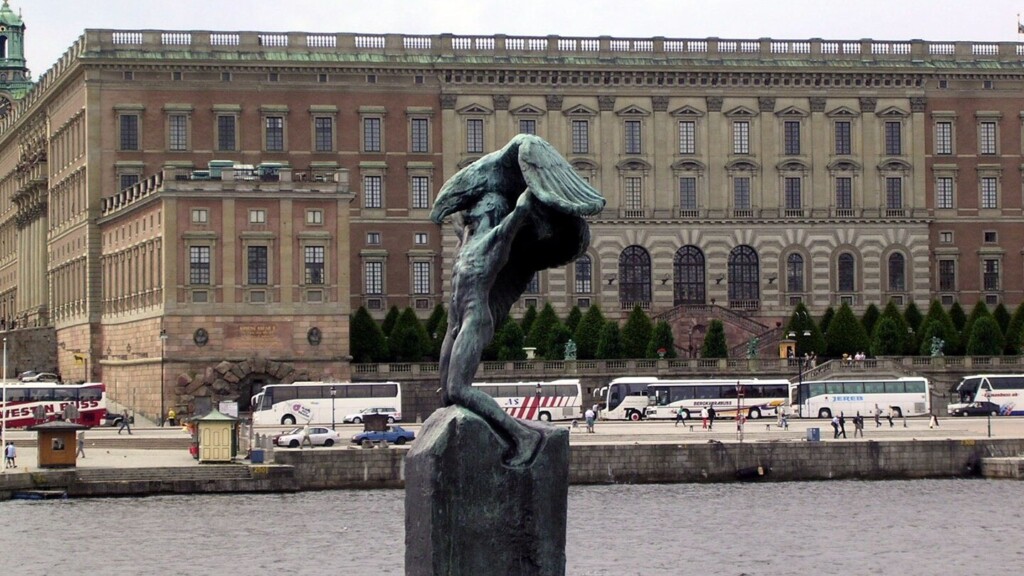Art + Research: Coloniality, materiality and the public art/spaces
A conversation about traces of colonialism in public art and spaces. How can a critical discussion about those traces challenge the presupposed “neutrality” of Sweden? How can artists and researchers work to make critical knowledge about this reach a wider audience?
Participants
Hanni Kamaly, artist
Lena Sawyer, senior lecturer, Department of social work at Gothenburg University
Michael Barrett, curator, Museum of World Culture
Alessandro Petti, professor of architecture and social justice, Royal Institute of Art
The conversation will be moderated by Mårten Snickare, professor in art history and the administrative director of Accelerator. It was initiated and arranged by Jelena Jovičić, project leader Art + Research, Accelerator.
The conversation was held at Accelerator. Admission free, no advance booking required. Language: English.
The conversation was recorded and is now available as a podcast.

’A message, of your life, how you got here, of your humanity, of those before and those who came after and who are waiting to be? An edit that Tore Strindberg had not imagined or hoped for.’ (Lena Sawyer, in ‘listening’ with Gothenburg’s Iron Well, 2020)
The violent legacy of colonialism has not only left behind marks in the colonized territories and its inhabitants; the exploitation of land, people and materials is well ingrained in the streets, buildings and art collections of many European countries, including Sweden. This seminar gathers artists, curators and scholars whose work inquires the issue of coloniality in the public art/spaces and how such practices can help us reexamine and deconstruct the dominant knowledge around the presence of colonial structures in our everyday lives. In this joint conversation we aim to address the ways in which art, research and practices at their intersections work towards uncovering traces of colonial residues present in the public spaces and art pieces in the cities we live in. How come many of these places remain unseen and still need to be uncovered? Where can such places be spotted in the context in which we are currently embedded? Once this knowledge is uncovered and shared, what can be done to interact and intervene with these spaces? In other words, how do we understand the process of decolonization in this context?
Bios
Lena Sawyer holds a Ph.D in cultural anthropology (2000) from the University of California Santa Cruz in 2000, and since then works in Sweden at the department of social work at Gothenburg University, where she focuses on understanding power from different perspectives and methodologies grounded in intersectionality and coloniality. Lena’s areas of competence include: Coloniality, Black feminisms, public space and memory, Black archives, Education and institutional discrimination.
Hanni Kamaly is a visual artist based in Stockholm. Kamaly received an MFA from Malmö Academy of Art and has also studied at Bergen Academy of Arts and the International Art Academy of Palestine. Kamaly’s work has been exhibited in numerous institutions and spaces including 34th Bienal de São Paulo in 2021, Moderna Museet Malmö (2020), Interkulturelt Museum, Oslo (2019/20), coyote, Stockholm (2020), Lunds Konsthall (2019), Ginerva Gambino, Cologne (2019), Tegel, Stockholm (2019), Moderna Museet, Stockholm (2018/19), Luleå Biennial (2018/19), Galleri Ping-Pong, Malmö (2018) Ahrenshoop Kunsthaus, Ahrenshoop (2018), Malmö Art Museum (2017/18), Skånes konstförening, Malmö (2017), Almanac, London (2017), Inter Arts Center, Malmö (2016) Rupert, Vilnius (2016).
Michael Barrett is an anthropologist, researcher, and curator of the Africa collections at the National Museums of World Culture in Sweden. His research focus is on the history of the collections as well as the representation of Africa and people of African descent in museums and other popular mediation practices. Among recent curatorial projects are the contemporary art shows Remixing the Future and Sonaxis (Etnografiska 2021), and Ongoing Africa (2017-2021) – critical development of research, exhibitions, outreach, and public programming in relation to the Africa collections at the Museums of World Culture.
Alessandro Petti is a professor of architecture and social justice at the Royal Institute of Art in Stockholm. Petti’s artistic, architectural, and educational practice interrogates and acts upon ideological, political, and social dimensions of architecture. In his artistic research practice, art exhibitions are sites of display and action that spill over into other contexts: architectural structures, critical learning environments, interventions that challenge dominant collective narratives, production of new political imaginations, the formation of civic spaces and re-definition of concepts. Petti is the co-founder of the architectural collective and residency program DAAR. In 2012, he initiated the experimental program Campus in Camps to overcome conventional educational structures.
